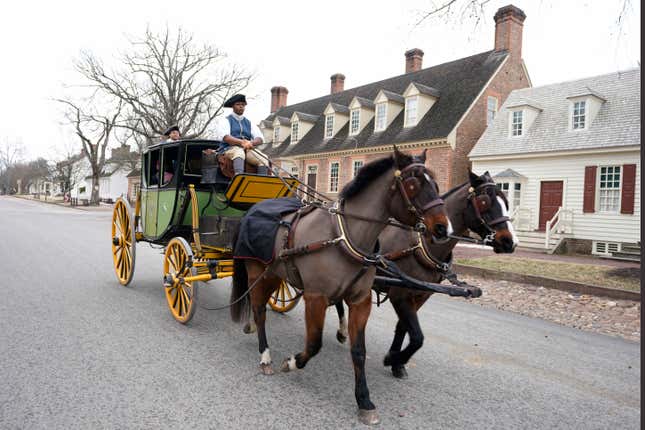
Historical attraction, Colonial Williamsburg, has begun honoring the Black coachmen of the Jim Crow era by naming a carriage after one of them, per the Associated Press. Although founded in 1926, the museum didn’t explore Black stories and share them until 1979.
Ywone Edwards-Ingram, professor at Virginia Commonwealth University in the Department of Focused Inquiry, told AP News about the history of the Black workforce in the colonial area.
From AP:
In a 2014 scholarly article, Edwards-Ingram pushed back against 1979 as a watershed year for inclusion because Black people had long worked there, sometimes in highly visible roles, even if they were not officially interpreters.
In the 1890s, before the museum was founded, Black residents served as guides for sightseers and later helped reconstruct buildings for the museum. They also worked in archaeology to help uncover physical evidence of the colonial capital. And some dressed in costume, performing tasks such as candle making, Edwards-Ingram said.
She said the segregation-era coachmen essentially were interpreters — even ambassadors — for passengers and dignitaries.
Driving coaches were more than just drivers, they were responsible for the experience of those who visited, according to AP. Visitors included Queen Elizabeth, Sir Winston Churchill and Dwight Eisenhower.
Benjamin Spraggins, who is being honored with a carriage at Colonial Williamsburg, was particularly known for how he provided a “cultural performance of the carriage ride” and “controlled the visitors’ experience,” reported AP News. He was the blueprint for the following coachmen.
However, racism kept them from getting the recognition they deserved even amongst the people they provided tours to.
From AP:
“When you look at the photograph collections of Colonial Williamsburg, many times their names were not even mentioned,” Edwards-Ingram said. “That’s why it’s important to name that carriage. You’re making things visible.”
The museum’s coach, Jeter, and the grandson of coachmen Benjamin Spraggins, Darrell Jimmerson, said the racism from the early 1900s still persists in present day, via AP. Some visitors utter racist remarks while on tours or scold in disbelief that Black people lived and worked there.
Regardless of the haters, it’s refreshing to see more of our Black hidden figures brought to light. Spraggins is being honored with the newest carriage: a four-wheeled carriage with double seats facing each other. The ceremony will be held in person and virtually Feb 26., via the Colonial Williamsburg website.

